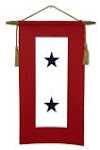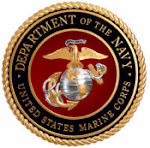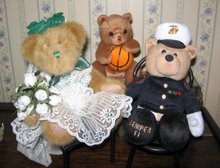It always happens: when you start making a list, you leave something off. Better just to make generalizations.
My V.I. Day post gave a general thank-you to "Soldiers, Sailors, Airmen, Marines, and Coast Guardsmen" without naming anybody in particular. Now, I'm sure that the General of the Hour would consider himself privileged to be counted as one of those soldiers -- but it nevertheless needs to be said that credit for Victory in Iraq requires us to list the following names:
Petraeus, Petraeus, Petraeus, Petraeus, Petraeus, Petraeus, Petraeus, Petraeus, Petraeus, Petraeus,........
And did I mention
PETRAEUS?

Thanks, Peaches.
I also gave a general thank-you to "steadfast, occasionally visionary, politicians" and to our "Coalition partners". There are a couple of names required in those categories too, though in March of 2003, and for a considerable time afterward, neither of these would have considered themselves either as politicians or members of any coalition that included Americans. How times have changed.

There is Nouri Al Maliki, the soft-spoken first Prime Minister of the New Iraq, who sometimes seems soft-headed too, but has managed, against great odds and mortal dangers, to keep his hand on the rudder of his country's future, with spectacular results (despite the herculean efforts of American congressional Democrats to thwart, undermine, and insult his achievements).

There is also Sheikh Abdl Sattar Abu Risha, first leader of the Anbar Awakening. He was assassinated for it in September 2007, but is honoured in the continuity of his leadership example carried through to this day by other Anbar sheikhs (again, despite partisan congressional efforts to downplay or deny the historic allegiance between these Iraqi tribes and their American occupiers, towards a lasting peace).
History shall remember their courage.
Also among our Coalition Partners can be included (but impossible t o list) the people of Iraq who began their career as free agents more than five years ago with desperately infantile and self-destructive looting of their own infrastructure, because under Saddam nothing had ever really been "their own" -- and who now have pledged not just their blood and labour but their maturity and self-discipline as a culture to overcome the fears and hatreds of the past, and to make peace with the invaders who, we must openly admit, broke a lot of bones and hearts and pottery in order to break the Iraqis' chains.
o list) the people of Iraq who began their career as free agents more than five years ago with desperately infantile and self-destructive looting of their own infrastructure, because under Saddam nothing had ever really been "their own" -- and who now have pledged not just their blood and labour but their maturity and self-discipline as a culture to overcome the fears and hatreds of the past, and to make peace with the invaders who, we must openly admit, broke a lot of bones and hearts and pottery in order to break the Iraqis' chains.
The Iraqi people, as a group, have suffered every conceivable kind of insult at the hands of the haters of George W. Bush, especially those in elected office -- those who, in a relentless quest to saddle the president with a disaster, have denied the reality of every particle of cooperation, progress and normalization which has proceeded, first in fits and starts and finally in a tidal-wave, over the past five years.
And among all  the politicians who slagged the Iraqi government and ignored its heroic track toward democracy, even as they slagged and slandered the American military (who are, in fact, the most expert diplomatic corps in the history of human society), no one has gone to greater lengths to flip the bird to the whole country of Iraq than our current Vice-President-elect, Jabbering Joe Biden.
the politicians who slagged the Iraqi government and ignored its heroic track toward democracy, even as they slagged and slandered the American military (who are, in fact, the most expert diplomatic corps in the history of human society), no one has gone to greater lengths to flip the bird to the whole country of Iraq than our current Vice-President-elect, Jabbering Joe Biden.
The Senator from Delaware pretended he was the only adult in the room by proposing, from way out in left field, that Iraq be partitioned into three self-governing provinces based on ethnicity and religion.
Ignoring the fact that there are more ethnicities at work than just three; that they do not live in easily-defined separate regions; that they are intermarried in great numbers both among ethnicities and religious factions; that if there is any governmental tradition "natural" to this ancient region, after millennia of waves and waves of invasion, it is by tribe rather than geographical or other type of boundary line; and (most importantly) that no one had even bothered to consult the Iraqis themselves about Biden's scheme for their future, the Senator from Unaware touted his flagrantly imperialist agenda from mid-2006 right through the Democratic primary season, as if it had been delivered straight down from (as 'twere) Mt. Sinai.
[Footnote: when the Iraqis were permitted a response to the idea, they hated it. HUGE.]
So let's not forget the immortal words of Idiot Joe in his Wapo op-ed of 2006:
Unfortunately, this administration does not have a coherent plan or any discernible strategy for success in Iraq. Its strategy is to prevent defeat and hand the problem off when it leaves office.
Here's your hand-off Joe: it's called VICTORY. Catch it if you can.
On this day for names, I reflect on one more leader of troops in to battle, a man I've met and heard speak a couple of times, a man who, in times of trouble, I would follow without hesitation. Lt. Col. Bryan McCoy, author of The Passion of Command -- and boy does he have it.
to battle, a man I've met and heard speak a couple of times, a man who, in times of trouble, I would follow without hesitation. Lt. Col. Bryan McCoy, author of The Passion of Command -- and boy does he have it.
Most often I think of him in a context which I did not personally witness. He was part of a CNN broadcast of April 9, 2003, the transcript of which is still available on the 'net here. Its subject was the fact -- the FACT -- that the invading American army was welcomed into Iraq as LIBERATORS, as witnessed by CNN reporters Ben Wedeman and Christiane Amanpour, plus Al Jazeera's Dima Khatib, Cox News' Craig Nelson, Abu Dhabi News' Jasim Al Azzawi, L.A. Times' Robin Wright, Lebanese Broadcasting's Tani Mehanna, and American Army Generals Wesley Clark and David Range, all interviewed by Larry King in the heady atmosphere of a "jubilant" Iraq.
Now, none of these voices was drunk with triumph -- all were temperate about what the future held -- but there was no question whatsoever that, at the moment of the taking of Baghdad, the Americans were being welcomed as Liberators throughout Iraq and parts of the wider region.
Then there was Col. McCoy's voice, that of a man who had fought his way into the country for 21 days, the latter half of them spent in full-blast battle rattle. He had already lost some of "his boys." It was Col. McCoy's boys who helped the locals bring down Saddam's statue in Baghdad's Firdos square (and no, they didn't "raise an American flag," they wiped Saddam's face with it -- nor did they try to claim that the square was packed with thousands when it wasn't, nor did they have to egg on the crowd to attack the statue -- they just helped complete the task the crowd was ill-equipped to do themselves).
But the idea that the military on the ground ever thought this job was going to be a "cakewalk" is belied by McCoy's answers to Larry King. Finally, in response to King's classic lazy-journalist question: "What about this venture has surprised you the most?" McCoy said,
What has surprised me the most is the closer we got to Baghdad, the more effusive the people were about welcoming us here. We thought it would be the opposite. It would be the closer we got to Baghdad, the less welcome we would be.
McCoy's realistic expectations echo the anti-rosy assessment of then two-star General David Petraeus a couple of weeks before , "Tell me how this ends? eight years and eight divisions?"
Well, Peaches, we're starting to know. Apparently, it ends well -- providing the folks in Washington don't screw it up again.
IT ENDS LIKE THIS:
TOUCHING THE FACE OF GRACE
Over at primo Milblog Mudville Gazette this story is passed along from CJ at A Soldier's Perspective (with the appropriate "tissue alert.") It's called Touching the Face of Grace and I present it here in full, because that's what it merits.
CJ writes:
I found this essay, written by the father of a deployed Soldier, on the American Legion website. It was introduced into the Congressional Record by Frank R. Wolf, R-Va, on September 16th. It's a very touching and inspirational story should be required reading by the defeatists in Congress. Here it is:
“Whatever your political take on the war in Iraq, nothing can alter it more than having a loved one in the midst of it. Nor is anyone’s current perspective balanced until they hear at least some things from a soldier’s point of view.
“My wife and I learned these truths when our son, a 2004 Handley graduate, decided to join the Army in 2006. His reasoning was simple: he wasn’t comfortable knowing that thousands of others his age were sacrificing their own freedoms to protect his. When he signed up to join those thousands, it changed our perspective as well.
“Up to that point, it had always been other people’s sons and daughters doing the fighting. Now it would be our own child. Naturally, no one wants their child to volunteer to go in harm’s way for freedom’s sake. It was something of a conviction, though, when my wife and I had to ask ourselves why it shouldn’t be our own son in the Middle East, why we should be spared the rituals of anxiety, prayer, hope and waiting that tens of thousands of other families over here have already endured.
“In early June, we flew to Fort Hood, Texas, to see our son deploy for a 15-month tour in Iraq. Again, one’s perspective is limited until one attends a deploying ceremony for a unit of soldiers. Spouses, children, parents, siblings and friends, all crowding a gym, all clinging closely to their treasures in uniform, accompanied by flags, prayers, cheers and tears. Our son had joined a ‘band of brothers.’ My wife and I had joined the ‘band of others’ who would be waiting at home. Both those going, and those left behind, carry the war on terror in a personal way.
“Still, those of us left behind need to see something of what our soldiers see, and not only what is offered us in the news. To that end, here is one story our son, Luke, shared with us by phone that must be shared with anyone who claims an interest in what our soldiers are doing in the Middle East.
“Stationed outside a city on the Tigris River, Luke had accompanied his colonel into town as part of a security team, while the colonel spoke with a local sheik. While standing guard, Luke noticed a woman approaching from behind and cautiously turned in her direction, his rifle at the ready.
“An interpreter told our son it was OK – the woman just wanted to touch a soldier. Still uneasy, Luke stood still while the woman reached out her hand and touched his face, tears in her eyes.
“Looking to the interpreter for meaning, our son was told that the woman simply ‘wanted to touch the face of grace.’ It seems this trembling woman, like most of the people in her town, looked upon our soldiers as angels of grace, sent by God to protect her from the violence and oppression her people had come to know up to then. Learning this, our son squeezed and kissed the woman’s hand, and she left, weeping.
“The ‘face of grace.’ How many of us, safe at home debating the politics of the war on terror, have ever seen our soldiers in such a light? How many of us have even read such an uplifting newspaper account of our soldiers?
“To be sure, our soldiers are not virtuous simply by being soldiers. At home in their ‘civvies’ they are as un-angelic as the rest of us. Yet when they voluntarily get into ‘full battle rattle’ (as they call their battle gear) in a hot and hostile land, their job is both protective and sacrificial – as angelic a purpose as humans can take on.
“People like this woman, having suffered years of oppression and fear, have eyes and a heart to see this, and the desire to “‘touch the face of grace.’ Do we have the ability to see our soldiers in the same way? And not merely our soldiers: Can we see the ‘face of grace’ in the police who protect us in every town, day and night? Or in the fire and rescue teams who are ‘soldiers’ in their own right?
“My wife and I obviously pray that our son and his ‘band of brothers’ will come safely home to their personal ‘band of others.’ After listening to our son’s experience, though, we have added the prayer that Americans in every community will be given the eyes and heart to see the ‘Face of Grace’ in all who protect our lives and freedoms – especially in soldiers like our son.”


















